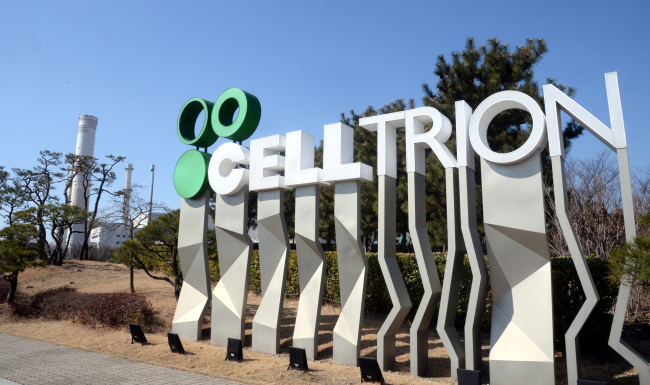Amid continued selling spree, foreign investors eye Celltrion shares
By Jie Ye-eunPublished : June 18, 2020 - 15:51

Despite their continued selling spree of local stocks, foreign investors have grabbed 427 billion won ($351.4 million) worth shares of local biopharmaceutical firm Celltrion’s key affiliates, according to stock market data Thursday.
The Korea Exchange noted that between June 1-17, Celltrion became the most purchased stock by offshore investors here, with net purchase of 291.1 billion won.
Celltrion Pharm was first on the list of foreigners’ top-bought stocks in the tech-heavy Kosdaq market, recording net purchase of 107.7 billion won. While they scooped up 28 billion won worth of Celltrion Healthcare’s shares.
Meanwhile, they net sold about 620 billion won worth stocks solely of firms listed on the nation’s main bourse Kospi.
Due to the massive buying by foreign investors, Celltrion Pharm’s stock price spiked 35.6 percent during the cited period. Shares of Celltrion Pharm and Celltrion Healthcare soared 50.6 percent and 17.4 percent, respectively.
In the meantime, Kospi and Kosdaq rose 5.5 percent and 3 percent, respectively.
Buoyed by its potential COVID-19 cure development and acquisition of primary care unit of Japanese multinational pharmaceutical firm Takeda’s Asia-Pacific business, shares of the major pharmaceutical giant escalated, according to market analysts.
Foreign investors are pinning hopes on a three-way merger of the three Celltrion affiliates.
At the JP Morgan Healthcare Conference in San Francisco in January, Celltrion Chairman Seo Jung-jin mentioned that he was willing to merge the firms “if shareholders request it.”
Some local analysts also said that the nation’s financial authorities’ stricter short selling regulation was favorable for the company.
Short selling is a strategy when an investor borrows a stock, sells it, and then buys it back to return to the lender, betting that the share price will drop.
As of Friday, the ratio of Celltrion’s short selling accounted for 6.44 percent, down 2.91 percentage points from a day before applying the six-month ban on short-selling on March 13.
“The local health care related stocks have benefited amid the temporary ban on stock short selling. The regulation accelerated the rise in their stock prices,” said Kim In-sik, an analyst at IBK Securities.
By Jie Ye-eun (yeeun@heraldcorp.com)



![[Exclusive] Korean military set to ban iPhones over 'security' concerns](http://res.heraldm.com/phpwas/restmb_idxmake.php?idx=644&simg=/content/image/2024/04/23/20240423050599_0.jpg&u=20240423183955)




![[Herald Interview] 'Amid aging population, Korea to invite more young professionals from overseas'](http://res.heraldm.com/phpwas/restmb_idxmake.php?idx=644&simg=/content/image/2024/04/24/20240424050844_0.jpg&u=20240424200058)

![[Pressure points] Leggings in public: Fashion statement or social faux pas?](http://res.heraldm.com/phpwas/restmb_idxmake.php?idx=644&simg=/content/image/2024/04/23/20240423050669_0.jpg&u=)









